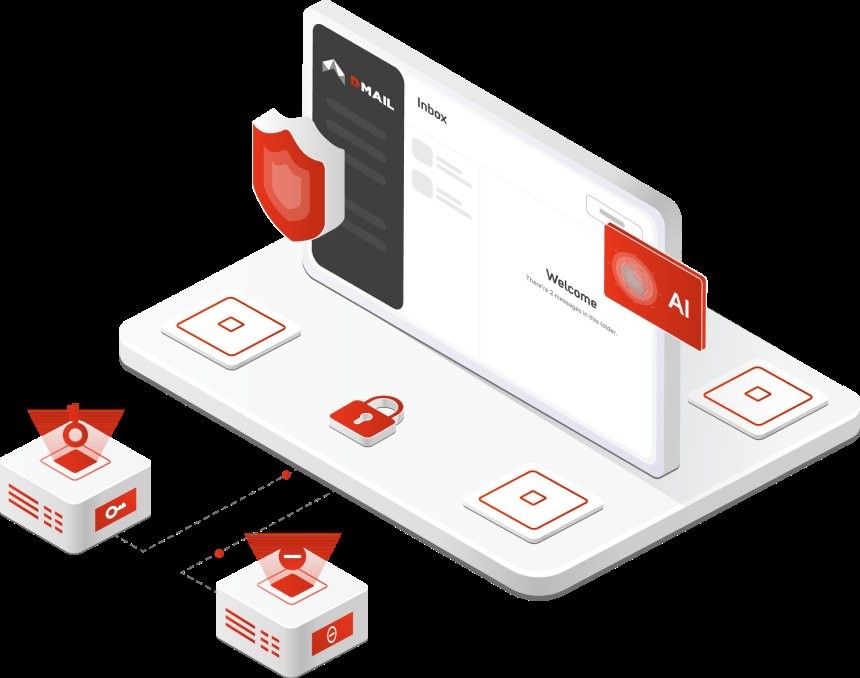Dmail Unveils Cutting-Edge Updates: Redefining Web3 Communication
 Mary Joseph Akpan
Mary Joseph Akpan
In the fast-evolving landscape of Web3, Dmail has emerged as a trailblazer, continuously pushing the boundaries of secure, decentralized communication. As of March 31, 2025, the latest updates from Dmail showcase its commitment to integrating advanced technologies like artificial intelligence (AI), zero-knowledge proofs (ZKPs), and decentralized infrastructure, positioning it as a leader in privacy-focused email solutions. Here's a deep dive into the most recent developments from Dmail and what they mean for the future of Web3 communication.
A New Era of Encrypted Communication
Dmail, a Web3-native email platform, has long been recognized for its emphasis on privacy and user sovereignty. Its latest update, highlighted in recent announcements, reinforces this mission by enhancing its infrastructure to support secure, encrypted communication across 37 blockchain networks. By leveraging decentralized identity (DID) systems and ZKPs, Dmail ensures that users maintain control over their data while enjoying a seamless and private email experience. This update makes it possible to send emails that are not only encrypted but also stored on-chain, a feature that sets Dmail apart from traditional email providers like Gmail or Outlook.
Imagine sending an email that’s fully encrypted and verifiable on a blockchain, Dmail has made this a reality. This advancement is particularly significant in an era where data breaches and privacy concerns dominate headlines, offering users a decentralized alternative that prioritizes security without compromising usability.
AI-Powered Enhancements: Smarter and More Efficient
One of the standout features of Dmail’s recent update is the upgrade to its AI Mail Assistant. The integration of cutting-edge AI models, including ChatGPT and DeepSeek, has transformed the assistant into a powerful tool for users. Whether drafting emails, editing content, or generating quick replies, the AI Mail Assistant now delivers smarter, context-aware responses. To entice users to explore this feature, Dmail is offering 20 free credits, allowing individuals to experience firsthand how AI can streamline their communication workflows.
This move aligns with Dmail’s broader vision of incorporating AI to enhance user experience while maintaining the decentralized ethos of Web3. Posts on X have praised this update, with users noting the assistant’s ability to craft replies that feel natural and precise, further bridging the gap between traditional email functionality and futuristic innovation.
Expanding the Roadmap: Future Features on the Horizon
Dmail’s ambitions don’t stop at its current offerings. The platform has teased an expanded roadmap that promises to tackle some of the most pressing challenges in the Web3 space. Among the anticipated enhancements are voice support, autofill capabilities, and an AI-powered search function that could revolutionize how users interact with their inboxes. Additionally, Dmail plans to introduce the ability to convert email templates into non-fungible tokens (NFTs), a feature that could open new avenues for creativity and ownership in digital communication.
These forthcoming features underscore Dmail’s proactive approach to staying ahead of the curve. By blending blockchain technology with practical, user-friendly tools, Dmail is not just keeping pace with Web3 trends, it’s setting them.
Strengthening Ecosystem Ties
Dmail’s recent activities also highlight its deep integration within the Web3 ecosystem. Following the release of the Internet Computer Protocol’s (ICP) new roadmap, Dmail participated in a developer meetup at ICP’s headquarters in Zurich. As a leading AI and user-aligned Web3 (UAW) project on ICP, Dmail’s presence at the event reaffirmed its strong ties to the ecosystem. This collaboration signals exciting possibilities for future interoperability and innovation, with Dmail poised to play a pivotal role in ICP’s growth.
Additionally, Dmail has expanded its reach by integrating with networks like Vara and Linea, making its encrypted email services accessible to a broader audience. These partnerships demonstrate Dmail’s commitment to building a robust, multi-chain infrastructure that caters to the diverse needs of Web3 users.
Why It Matters
The significance of Dmail’s latest update lies in its response to a critical need in Web3: private, secure, and decentralized communication. Traditional email systems, while convenient, often leave users vulnerable to surveillance and data exploitation. Dmail’s use of ZKPs and DID ensures that sensitive information remains confidential, while its DePIN-ready (Decentralized Physical Infrastructure Network) framework paves the way for a more resilient and scalable communication platform.
For the average user, this translates to peace of mind and greater control over their digital footprint. For the Web3 community, it’s a step toward realizing the promise of a decentralized internet where privacy isn’t an afterthought but a foundational principle.
Looking Ahead
As Dmail continues to roll out these updates, the platform is building trust and momentum in the Web3 space. Its blend of AI-driven functionality, blockchain security, and an ambitious roadmap positions it as a key player in redefining how we communicate in a decentralized world. Whether you’re a privacy enthusiast, a blockchain developer, or simply someone curious about the future of email, Dmail’s latest advancements are worth watching.
With its sights set on further innovation, Dmail is not just adapting to the Web3 revolution it’s helping shape it. As the platform evolves, it’s clear that Dmail is here to stay, offering a glimpse into a future where communication is secure, sovereign, and smarter than ever before.
Subscribe to my newsletter
Read articles from Mary Joseph Akpan directly inside your inbox. Subscribe to the newsletter, and don't miss out.
Written by
